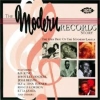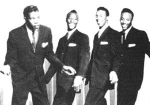
Formed in 1945 in Los Angeles by Saul, Joe and Jules Bihari, Modern Records seemed much more inclined to do whatever it took to succeed commercially than many other labels of the period (e.g. Aladdin, King etc.). Having said that, although it had a few fairly substantial hits from 1954-1956, it never really consolidated its position, despite or perhaps because of its rather cavalier recording policy.
The Biharis grew up in Tulsa Oklahoma and moved to LA in 1942. Jules Bihari got a job servicing and operating jukeboxes in what were then predominantly black neighbourhoods (alternative histories have the fourth brother, Lester, employed in the jukebox distribution business). It was whilst doing this job that he spotted the lack of proper funding and distribution for blues records he knew his customers wanted to hear, but which could be difficult to stock (or even find).

The Biharis had a keen ear for talent and in an effort to be commercially viable, Modern recorded R&B, country and western, jazz, popular blues and gospel. Subsidiaries such as RPM (formed in 1950) showcased the likes of B.B. King, Johnnie Guitar Watson and Roscoe Gordon amongst others, broadening the range further with forays into rock’n’roll. The biggest hits came on RPM, notably with the Jacks ballad ‘Why Don’t You Write Me’ and the teen ballad ‘Eddie My Love’ by the Teen Queens (a hit despite the Fontaine Sisters cover for the popular market). Flair was formed in 1953 and featured the great Richard Berry (‘Louie Louie’). Possibly the most famous of the subsidiaries in retrospect is the Kent label, originally formed in 1958 but revived in 1965 for album reissues under the same ownership as Modern after the latter’s decline.
All of the labels remained a family concern with brothers Saul, Jules and Joe acting as president and vice-presidents of all labels and another brother (Lester) acting as head of Sales and Promotion. Joe and Jules both got involved in A&R, along with the likes of Maxwell Davis. Modern was also one of the few rhythm and blues companies to make a practice of covering other label’s R&B hits in an effort to sweeten up production a little and make them more palatable to the pop end of the marketplace. Nonetheless, in the early 50s, it also managed to attract a number of fine blues performers to the label, including B.B. King, Roscoe Gordon, Elmore James, Lightnin’ Hopkins, Little Willie Littlefield, Jimmy Witherspoon and John Lee Hooker.

In addition to a good ear and an acute sense of business, the Biharis also indulged in some of the shadier practices that were all too prevalent at the time. In particular, they ensured a healthy share of royalties by establishing songwriting credits for material they had no real role in developing. Jules went under the pseudonym of Jules Taub, a well known name to be found on a lot of B.B. King’s early material. B.B.’s Boogie and B.B.’s Blues were both little more than King jams that clearly required no additional songwriting help, but the Biharis established a credit for simply turning up and recording the session!
Modern’s willingness to record anything that might sell contrasted with many labels of the time. In addition to the previously mentioned hits they also succeeded with the Cadets’ novelty ‘Stranded In The Jungle’ (the Cadets were the Jacks under a different name), Joe Houston’s ‘Blow Joe Blow’ and Jesse Belvin’s lovely ‘Goodnight My Love’. The Biharis were undoubtedly ahead of their time in a number of areas, especially in the marketing department. The Jacks / Cadets story is a case in point, a single group of musicians with two distinct musical identities, years before the likes of George Clinton made a whole career out of doing something similar.
One of the more interesting things about the Modern story was its very early foray into the album market. Initially the Bihari brothers put out a series of high quality releases, but they soon began to concentrate on budget productions, largely through the Crown subsidiary. This often meant the use of generic sleeve jackets (cardboard covers, no liner notes, no inner plastic sleeves) that could be reused for many releases. Song titles were often omitted from the back cover precisely because the sleeves could be re-used on other artists’ recordings. What this often meant of course is that a lot of very good music was shoddily presented and ill served by such an approach.

Even the great B.B. King’s albums got the same treatment as the rest of the Crown budget catalogue. A lot of what was great musically was subject to shoddy production values in this way, including releases by John Lee Hooker, Etta James and Elmore James. Despite, or perhaps because of this tough business approach to commercial success, in the mid 1960s the original company went bankrupt. It was then that Kent was reformed with essentially the same management structure.
Saul Bihari’s approach to the business of music production can be summed up by his quote to a Billboard reporter: – “We used to bring ’em in, give’em a bottle of booze and say “Sing me a song about your girl.” Or, “Sing me a song about Christmas. They’d pluck around a little on their guitars, then say “OK” and make up a song as they went along. We’d give them a subject and off they’d go. When it came time to quit, we’d give them a wave that they had ten seconds to finish.” Despite this view of musicians and its eclectic recording policy, some great records still came out of the Modern label and its subsidiaries – hear for yourself on “The Modern Records Story: the Very Best of the Modern Labels“, issued by Ace Records.
Jesse Belvin
Best remembered now for writing the’ doo-wop smash ‘Earth Angel’ and his own hit ‘Goodnight My Love’, Belvin was an underrated singer whose career was cruelly cut short. After leaving Modern, by 1959 his career was on an upswing as he joined RCA (‘Guess Who’ was a Top 40 hit) and he looked to have crossover potential at the time he and his wife were killed in a head on car crash in 1960.
The Jacks
Two groups (the Cadets was the other), one set of singers. As the Jacks, they scored with the R&B hit ‘Why Don’t You Write Me’, as the Cadets they managed a #15 pop hit in 1956 with the novelty song ‘Stranded In The Jungle’. The latter was an example of the Biharis taking another R&B song (by the Jay Hawks) and putting together their own, admittedly superior version, and getting the pop hit.
Shirley Gunter
Gunter was one of the first women in rock & roll, helping to pave the way for others – a true pioneer. She recorded on Modern with her group The Queens, making a huge impact on the West Coast with ‘Oop Shoop’, covered by the Crewcuts for the pop market. By the end of the 50s Shirley had already pulled out of the pop limelight, having set the standard for women to lead their own groups.
Joe Houston
Houston was an R&B saxman who recorded for just about everybody in the 50s. Although he recorded through the jump blues and rock and roll eras, his own style was incredibly simple and direct. He tended to wail as hard as he could, when on stage – limited but very exciting. His Modern recordings are exciting sax playing at its best.
Richard Berry
If for no other reason than that he was the original writer and performer of ‘Louie Louie’, Richard Berry holds a permanent place in the history of rock & roll. He was also quite an important, if secondary figure in the Los Angeles R&B music scene. He originally recorded ‘Louie Louie’ in 1956 but it was never more than a regional hit for him but he did eventually win back the songwriting credit.
Little Willie Littlefield
Texas born pianist Littlefield recorded the wonderful ‘K.C. Loving’ (later a massive seller for Wilbert Harrison as ‘Kansas City’) for the King subsidiary Federal in 1952 but had previously recorded some fine sides for Modern from 1949 onwards. ‘It’s Midnight’, ‘Farewell’ and ‘I’ve Been Lost’ were all sizeable hits and he proved to be an exciting and much loved live performer in the LA clubs and with his touring band, which included Maxwell Davis on sax.
The Teen Queens
‘Eddie My Love’ was their big success, a sweet and simple ballad that made 14 on the pop charts in 1956, even though it was covered by both the Chordettes and the Fontaine Sisters. Many have described it has amateurish, though few deny its charm. Follow-ups were less successful, they moved to RCA for a one record deal in 1958. After a few recordings with Antler Records they called it a day in 1961.

Very nice overview. Can’t fault the recommendation either. But now you’ve covered Modern, how about Apollo, King, Federal etc. Maybe a special section on a collection of the small scale independent labels that recorded so much great early R&B and then fell by the wayside. Just a thought!
Thanks for the kind comments. Part of me would love to cover more of the indie labels from the 50s but then I remember why I closed down Shades of Blue in the first place – grew like topsy, labour intensive to maintain and lost its focus. So, I’ve allowed head to rule heart and kept this primer as tight as possible. But, never say never!